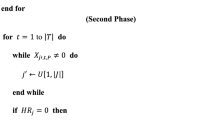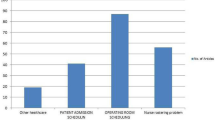Abstract
In this paper, we study a dynamic operating room scheduling problem which consists of three stages. The problem simultaneously tackles the capacity allocation of operating rooms to each specialty, assignment of operating rooms to surgeons, assignment and sequence of patients. To lower the total costs of operating rooms from both sides of patients and operating rooms, a mathematical model is proposed with objective of minimizing the patient waiting costs and operating room overtime costs. Some structural properties of the studied problem are proposed, and two heuristic algorithms are presented to solve the patient assignment problem based on these structural properties. The studied operating room scheduling problem is proved to be NP-hard, and a hybrid GWO-VNS algorithm combining Grey Wolf Optimizer (GWO) with Variable Neighbourhood Search (VNS) is developed to obtain a good solution, where the heuristic algorithms are incorporated. Finally, computational experiments are conducted to test the efficiency, stability, and convergence speed of the proposed algorithm and compared with other mainstream algorithms. The results show that our proposed algorithm outperforms the compared algorithms.














Similar content being viewed by others
References
Aringhieri R, Landa P, Soriano P et al (2015) A two level metaheuristic for the operating room scheduling and assignment problem. Comput Oper Res 54:21–34
Astaraky D, Patrick J (2015) A simulation based approximate dynamic programming approach to multi-class, multi-resource surgical scheduling. Eur J Oper Res 245:309–319
Cardoen B, Demeulemeester E, Beliën J (2006) Optimizing a multiple objective surgical case scheduling problem. DTEW-KBI_0625, pp 1–38
Choi S, Wilhelm WE (2014) An approach to optimize block surgical schedules. Eur J Oper Res 235:138–148. https://doi.org/10.1016/j.ejor.2013.10.040
Denton BT, Miller AJ, Balasubramanian HJ, Huschka TR (2010) Optimal Allocation of Surgery Blocks to Operating Rooms Under Uncertainty. Oper Res 58:802–816
Guido R, Conforti D (2017) A hybrid genetic approach for solving an integrated multi-objective operating room planning and scheduling problem. Comput Oper Res 87:270–282
Guinet A, Chaabane S (2003) Operating theatre planning. Int J Prod Econ 85:69–81
Hansen P, Mladenović N (2001) Variable neighborhood search: principles and applications. Eur J Oper Res 130:449–467
Holte M, Mannino C (2013) The implementor/adversary algorithm for the cyclic and robust scheduling problem in health-care. Eur J Oper Res 226:551–559
Hosseini N, Taaffe KM (2015) Allocating operating room block time using historical caseload variability. Health Care Manag Sci 18:419–430
Jebali A, Hadj Alouane AB, Ladet P (2006) Operating rooms scheduling. Int J Prod Econ 99:52–62
Lee S, Yih Y (2014) Reducing patient-flow delays in surgical suites through determining start-times of surgical cases. Eur J Oper Res 238:620–629
Lei D, Guo X (2016) Variable neighborhood search for the second type of two-sided assembly line balancing problem. Comput Oper Res 72:183–188
Lin Y-K, Chou Y-Y (2019) A hybrid genetic algorithm for operating room scheduling. Health Care Manag Sci
Marques I, Captivo ME, Vaz Pato M (2015) A bicriteria heuristic for an elective surgery scheduling problem. Health Care Manag Sci 18:251–266
Min D, Yih Y (2010) Scheduling elective surgery under uncertainty and downstream capacity constraints. Eur J Oper Res 206:642–652
Mirjalili S, Mirjalili SM, Lewis A (2014) Grey wolf optimizer. Adv Eng Softw 69:46–61
Penn ML, Potts CN, Harper PR (2017) Multiple criteria mixed-integer programming for incorporating multiple factors into the development of master operating theatre timetables. Eur J Oper Res 262:194–206
Pham DN, Klinkert A (2008) Surgical case scheduling as a generalized job shop scheduling problem. Eur J Oper Res 185:1011–1025
Qu X, Peng Y, Kong N, Shi J (2013) A two-phase approach to scheduling multi-category outpatient appointments–A case study of a women’s clinic. Health Care Manag Sci 16:197–216
Riise A, Mannino C, Burke EK (2016) Modelling and solving generalised operational surgery scheduling problems. Comput Oper Res 66:1–11
Saadouli H, Jerbi B, Dammak A et al (2015) A stochastic optimization and simulation approach for scheduling operating rooms and recovery beds in an orthopedic surgery. Comput Ind Eng 80:72–79
Taherkhani M, Safabakhsh R (2016) A novel stability-based adaptive inertia weight for particle swarm optimization. Appl Soft Comput J 38:281–295
Tànfani E, Testi A (2010) A pre-assignment heuristic algorithm for the Master Surgical Schedule Problem (MSSP). Ann Oper Res 178:105–119
Testi A, Tanfani E, Torre G (2007) A three-phase approach for operating theatre schedules. Health Care Manag Sci 10:163–172
Vallada E, Ruiz R (2011) A genetic algorithm for the unrelated parallel machine scheduling problem with sequence dependent setup times. Eur J Oper Res 211:612–622
Van Houdenhoven M, Van Oostrum JM, Hans EW et al (2007) Improving operating room efficiency by applying bin-packing and portfolio techniques to surgical case scheduling. Anesth Analg 105:707–714
Vancroonenburg W, Smet P, Vanden Berghe G (2015) A two-phase heuristic approach to multi-day surgical case scheduling considering generalized resource constraints. Oper Res Heal Care 7:27–39
Vijayakumar B, Parikh PJ, Scott R et al (2013) A dual bin-packing approach to scheduling surgical cases at a publicly-funded hospital. Eur J Oper Res 224:583–591
Acknowledgements
This work is supported by the National Natural Science Foundation of China (Nos. 71601065, 71690235 and 71690230), the Key research and development projects in Anhui (1804b06020377), the Basic scientific research projects in central colleges and Universities (JZ2018HGTB0232), and Innovative Research Groups of the National Natural Science Foundation of China (71521001).
Author information
Authors and Affiliations
Corresponding author
Additional information
Publisher's Note
Springer Nature remains neutral with regard to jurisdictional claims in published maps and institutional affiliations.
Rights and permissions
About this article
Cite this article
Zhu, S., Fan, W., Liu, T. et al. Dynamic three-stage operating room scheduling considering patient waiting time and surgical overtime costs. J Comb Optim 39, 185–215 (2020). https://doi.org/10.1007/s10878-019-00463-5
Published:
Issue Date:
DOI: https://doi.org/10.1007/s10878-019-00463-5




